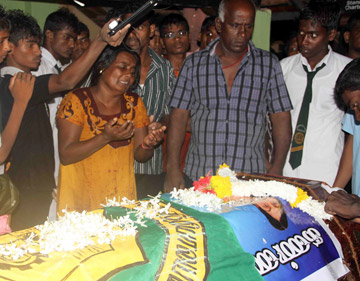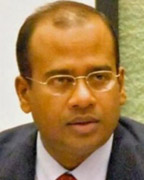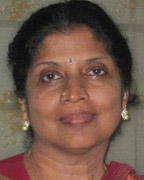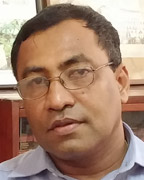What now?
The rape and murder of 17-year-old Vidhya and the
aftermath:
by Manjula Fernando
 Punkudutivu is a small island of about 6000 people, located off
Jaffna, in close proximity to Nagadeepa. It has no jungles or dense
forest cover for outsiders to hold up in after committing gruesome acts
of crime. Punkudutivu is a small island of about 6000 people, located off
Jaffna, in close proximity to Nagadeepa. It has no jungles or dense
forest cover for outsiders to hold up in after committing gruesome acts
of crime.
Yet, Vidhya, a 17- year-old school girl, was subjected to the most
horrifying acts of violence, by nine men who gang-raped her and then
brutally squashed her life. This happen in Pungudutivu. Her
rapists/murderers were not outsiders. They were fellow villagers albeit
after liquor.
Brutal rape and murder shocked a whole nation. Some vented out their
anger by blaming the police, the lawyers and State authorities in
violent protests. Others expressed alarm at the level of social erosion
witnessed in a once highly conservative society.
Why do men resort to rape?
How much does humanity society contribute to such despicable violent
incidents?
And how would the incident and its aftermath impact post-war
developments in the North?
Sunday Observer spoke to a few leading personalities who are experts
in their given disciplines.
Incident not exceptional, aftermath disturbing
 Additional Solicitor General Yasantha Kodagoda, PC says, the rape and
murder may seem, the situation in Sri Lanka with regard to the child
rape and murder, is not exceptional as it is commonly found in most
countries.” Additional Solicitor General Yasantha Kodagoda, PC says, the rape and
murder may seem, the situation in Sri Lanka with regard to the child
rape and murder, is not exceptional as it is commonly found in most
countries.”
However he says, claiming , the reaction of certain segments of the
community to what happened was disturbing. “Violence was unleashed and
property was damaged.
There was a serious disturbance of law and order.” Emphasising the
need to look at what happened from a psycho-social, political and
security perspective, he pointed out that political and social leaders
of the society have to seriously consider what happened and address the
issue.
“There seems to be certain root causes in public perceptions and
social views and attitudes towards the State and its agent. I also
wonder whether political and anti-State activism, as well as
opportunisms played a certain role in what happened, he says pointing
out that the aftermath was a sad reflection of the social reaction to
the incident, possibly influenced by pent up frustrations and the
perception of segments of the community to how the ‘state system’
handled the entire matter.
Still, he stresses, no such root causes can justify the disturbance
of law and order and the committing of acts of violence. Claiming that
he had no doubt regarding the sincerity of the investigators and their
commitment to conduct a prompt, impartial and comprehensive
investigation into the gruesome crime,” the Additional Solicitor
General said, in addition to conducting a proper investigation, the
police need to focus on providing a sufficient feed back to the victim’s
family, including of the challenges they are encountering.
“Without such a feedback, under certain circumstances, the victim’s
family and other segments of the community may doubt the integrity of
the investigation process,” he says adding a challenge for the
investigators would be not only to unravel what exactly happened, but to
enable all perpetrators of the crime to be successfully prosecuted,
convicted and punished in terms of the law, following a fair trial.
“To achieve that goal, the police will have to collect testimonies of
lay, official and expert witnesses, documentary evidence and real
evidence, which has the potential of being converted into reliable
evidence at the trial,” he said.
“Particularly in the absence of the victim to tell what happened, and
eye witness evidence, forensic evidence is likely to play a key role in
this case,” he adds.
Violent and brutal environment has warped personalities
Shanthi Sachithanandam, CEO of Viluthu, a civil society group is of
the view that Jaffna was suffering due to the breakdown of traditional
social structures in a post- war scenario.
 “Families have been torn apart due to displacement, deaths and
migration. “Families have been torn apart due to displacement, deaths and
migration.
The values that were safeguarded by these structures have also been
destroyed as a result. The younger generation has grown up seeing
violence and brutality. I think this environment gives way to warped
personalities.”
But she says, the more important factor is the militarization in the
North. “If you analyse the background of every perpetrator since 2009,
either he has been working for the military or their intelligence or for
the armed groups working in support of the Army and the (former)
Government.
This gives them immense power and they are used to the immunity that
was there for all such perpetrators in the past.
These individuals have seen a lot of violence and been witness to
torture methods. The macho cult built by the former regime also
contributed to this.
“Almost all the perpetrators in the past have been released on bail
and appear to have gone scot-free. The lack of faith in the police and
the judiciary gave rise to the peoples revolt.
“Of course, the impending elections and the competing powers of the
last regime led the events to be politicised and then turn violent.
But Sachithanandam said the hordes of teachers students women and
youth who came out on the street demanding justice for Vidhya were not
part of this group,” she says.
Locals should have been more vigilant
 Senior lecturer of Law at the Colombo University A. Sarveswaran who
was born and bred in Jaffna says youth in the North are increasingly
becoming addicted to drugs and alcohol, a concern that needs to be
focused by the State authorities if they wish to arrest the latest trend
of crime in the region before it grows out of control. Senior lecturer of Law at the Colombo University A. Sarveswaran who
was born and bred in Jaffna says youth in the North are increasingly
becoming addicted to drugs and alcohol, a concern that needs to be
focused by the State authorities if they wish to arrest the latest trend
of crime in the region before it grows out of control.
He says the role that should be played by the locals in keeping their
environs safe is also critical. “Had the people been more vigilant, this
crime could have been averted and Vidhya could still be among the
living”.
The senior lecturer who is also the Coordinator of Conflict and Peace
Studies Program at the Colombo University says the incident will have a
serious impact on resettlement and reconciliation process and
achievement of sustainable peace.
“The nature of the crime and the behaviour of the suspects shows that
it was pre-planned. There seem to be a gap, lack of connection between
the police and the masses, highlighted by the allegation that there was
a deliberated delay in recording the complaint by Vidhya’s parents that
she had been missing since morning.”
Such incidents will be an added incentive to demand police powers to
provinces under the 13th Amendment. He says this was already a
contentious issue. “As I understand people have a confusion over public
order and national security. Public order comes under police powers
whereas the military must ensure national security. Police powers to
provinces should not be a threat to national security. “
The suspects are now behind bars but, he says, a heightened level of
politicization of the issue, is disheartening. “Certain politicians try
to capitalise on the issue by either slinging mud at their opponents or
aiming to become popular.
“There are baseless allegations against V.T. Thamilmaran, Dean
Faculty of Law of the Colombo University. These allegations have emerged
from fabricated stories, if anyone has any evidence to implicate him
with the crime, it can be submitted to the police for necessary action,”
he claims adding that the case is being dragged in different directions,
resulting the focus to shift. “The focus must be to prosecute and mete
out maximum punishment to those who are responsible, he emphasises. “It
will send a strong message to the ‘criminal minded’ that such abhorrent
acts will be dealt with no lesser terms.”
He says making allegations against people on unsubstantiated
information will not help the case, on the contrary it will affect the
legal process to punish the culprits.
“People have a democratic right to protest against injustices, having
said that it should not be forgotten that protests can lead to violence
and people driven by emotions fall easy pray to those having ulterior
motives,” he says adding,
This is the sad part. Therefore, people should be vigilant of such
moves. “It is my belief that a program to cultivate good relations
between the community and the Police are the need of the hour. The
number of police stations too, must increase with frequent mobile
petrolling to narrow down the chances of wrong doing. I must also stress
the need for more Tamil speaking police women and men in the region to
bridge the language gap.”
Sarveswaran says despite the initial dereliction, the police must be
appreciated for arresting the suspects within a couple of days. He
opinesthat because of the nature of the crime and the developments
thereafter, the case should be conducted as trial at bar - with three
judges without a jury.
“Post -war society is very volatile in many countries. After the end
of a civil war, urban violence emerge. However, in the Northern province
of Sri Lanka it has emerged in a different form.” Breakdown of social
structures, erosion of social values, use of drugs, idle lifestyle due
to foreign remittances, pornography and lack of recreational activity
are seen as the main culprits for the crime wave that is witnessed in
the North today, he points out.
[Timeline]
*May 13 - Gang rape and murder of 17 year old school girl Vidhya
Sivayoganathan in Punkudutivu by local rowdies
*Eight suspects arrested and later the ninth suspect arrested in
Wellawatte,Colombo
*Violent protests spring up in Jaffna
*Businesses and schools close in protest
*May 20 -The police fire tear gas to disperse gang rape protesters.
Jaffna Courts pelted with stones
*Protests spread to Kilinochchi, Mullaitivu, Mannar and Vavuniya
districts
*Houses of some arrested suspects torched
*Five suspects attacked when they were produced at the hospital for
medical check-ups
An elegy to the raped...
*Today Vithiya Sivaloganadan: Who’s next? *
First they raped Manamperi nd buried her body alive
I did not speak
Because there was an insurrection
Then they came for women in Kahawatte
I did not speak
Because I was not from Kahawatte
Then they came for women in Nuriwatte
I did not speak
Because I did not live in Nuriwatta
Then, they came for Women in the North
I did not speak, because
Krishanthi Kumaraswami, Koneshwari, Isaipriya
They were not my sisters
Then they came for women with a different skin colour
Eight men gang-raped Victoria *Alexandra*
I did not speak
Because she was just a foreigner
Then they gruesomely gang-raped Rita John
Stabbed her body fifteen times
Left her murdered body on the Modera beach
I did not speak
Because she was an Indian
She was asking for trouble
By walking on the beach
with her jewelries in the evening
Then they gang raped a woman in Wijerama
I did not speak
Because she was just a prostitute
Then they raped hundreds of virgins
And celebrated with champagne in Akuressa and Monaragala
I did not speak
Because I am too scared of politicians
Then they raped Logarani
Threw her naked body into a sacred temple
Then they gang raped Saranya Selvarasa
I did not speak
Finally they raped
Vithiya Sivaloganadan
I did not speak
Because she is Tamil
She lived on a small Island in Kytes
By Shamila Daluwatte
|

